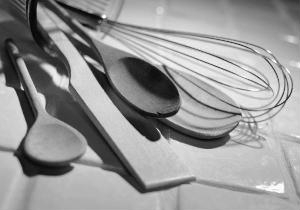 Whether you are a newlywed or have moved out on your own for the first time, you will need to prepare meals for yourself, your new husband, and any visitors you may have. Some of us have been fortunate enough to have our mothers or grandmothers take us into the kitchen as little girls and show us how to make many different things. Others may not have had anyone to teach them. Some people love to cook, and some people have no desire at all. Even if you had many experiences with cooking, your new husband may have grown up with very different recipes or ways to prepare them. Cooking and sharing a meal together is a great way to unwind and talk about your day, and it is very rewarding to feel like you are a blessing to your husband, family, or visitors. “She also rises while it is yet night, and provides food for her household and a portion for her maidservants” (Proverbs 31:15, NKJV). While some of our most memorable times are around the dinner table, preparing meals can become stressful, and having some basic tips can help to alleviate that stress.
Whether you are a newlywed or have moved out on your own for the first time, you will need to prepare meals for yourself, your new husband, and any visitors you may have. Some of us have been fortunate enough to have our mothers or grandmothers take us into the kitchen as little girls and show us how to make many different things. Others may not have had anyone to teach them. Some people love to cook, and some people have no desire at all. Even if you had many experiences with cooking, your new husband may have grown up with very different recipes or ways to prepare them. Cooking and sharing a meal together is a great way to unwind and talk about your day, and it is very rewarding to feel like you are a blessing to your husband, family, or visitors. “She also rises while it is yet night, and provides food for her household and a portion for her maidservants” (Proverbs 31:15, NKJV). While some of our most memorable times are around the dinner table, preparing meals can become stressful, and having some basic tips can help to alleviate that stress.
Kitchen Utensils
Sort through all of the kitchen supplies you have received as shower, wedding, or housewarming gifts. Some gadgets may be unfamiliar to you, so look at the package and instructions to know how to use them properly. In setting up your kitchen supplies, make sure you have varying sizes of pots and pans with lids, mixing bowls, roast pans, and casserole dishes. You will need some wooden spoons, pancake turners, slotted spoons, spatulas, tongs, a can opener, and some knives. For baking, you will need cookie sheets, muffin pans, cooling racks, a pie pan, and a set of measuring spoons and cups. Once you have the basics, you have what you need to make most dishes. Specific pans and utensils can always be purchased as you need them or with gift certificates you have received. If you have minimal cooking skills and not many meal ideas, invest in a cookbook. Many cookbooks contain pictures and uses of each kitchen tool, baking/cooking terms, and “how-to” pictures to cut, slice, measure, and bake correctly.
Cooking Ingredients
 As with the kitchen supplies, there are always certain ingredients you should keep on hand. Butter, eggs, milk, flour, sugar, salt, pepper, broths, cooking oil/spray, vegetables, fruits, and frozen meats are some common items that are used in recipes. Once you have an idea of what kinds of meals you will be preparing, create a list of all of the meals you know how to make and that you like. Always keep the basic ingredients stocked in your kitchen, as well as items needed to prepare the meals on your “master list.” Once you have your list of meals, you can even sit down and plan out your meals for each day of the week using that master list. Making this weekly plan can help with your grocery list, too. You will know what ingredients and side dishes you will need for each meal and whether or not you have it in your pantry already. This will help your budget and can prevent you from having to make multiple trips to the grocery store for things you have forgotten when you begin to cook the meal.
As with the kitchen supplies, there are always certain ingredients you should keep on hand. Butter, eggs, milk, flour, sugar, salt, pepper, broths, cooking oil/spray, vegetables, fruits, and frozen meats are some common items that are used in recipes. Once you have an idea of what kinds of meals you will be preparing, create a list of all of the meals you know how to make and that you like. Always keep the basic ingredients stocked in your kitchen, as well as items needed to prepare the meals on your “master list.” Once you have your list of meals, you can even sit down and plan out your meals for each day of the week using that master list. Making this weekly plan can help with your grocery list, too. You will know what ingredients and side dishes you will need for each meal and whether or not you have it in your pantry already. This will help your budget and can prevent you from having to make multiple trips to the grocery store for things you have forgotten when you begin to cook the meal.
Be Flexible
Never be afraid to try new things, either. Cut out or make copies of recipes you would like to try, and substitute a new recipe for a meal from your main list at least once a week, just for something new. Allow your list to be flexible. Keep ideas of lighter or heavier meal substitutions. If it’s 80 degrees and humid, scrap the beef stew idea for something lighter that won’t have you standing over a hot stove. If you have a slow-cooker, make sure and use it to your advantage on a day when you know you are busy and may not be home in time to prepare a big meal.
Entertaining
(Betty Crocker’s Cookbook: Bridal Edition)
 You may find yourself entertaining more often, and the more you entertain, the better you will become. When deciding what to prepare, keep in mind who is coming, whether it is to be a casual affair or a special celebration, where and when it will take place, and what your budget is. Always plan your main dish first, and remember to complement with side dishes. Make sure the flavors go together. A strongly flavored main dish needs a more mild side dish. If the meal is on the heavy side, try a lighter dessert. People will expect lighter dishes for breakfast and lunch and more hearty dinners. Consider hot foods and rich desserts in fall and winter and fresh, cool dishes in the summer. If there are multiple dishes that need to go into the oven at different temperatures, reconsider some of your options to include dishes that can be served cold, ones that can be served at room temperature, and ones that need to be served hot. Remember to stay organized and relaxed. People are coming over to spend time with you and have a good time. You do not need to impress them with exotic feasts, but serve good food that you enjoy, and your guests are sure to enjoy their time with you. “And make me savory food, such as I love, and bring it to me that I may eat, that my soul may bless you…”(Genesis 27:4, NKJV).
You may find yourself entertaining more often, and the more you entertain, the better you will become. When deciding what to prepare, keep in mind who is coming, whether it is to be a casual affair or a special celebration, where and when it will take place, and what your budget is. Always plan your main dish first, and remember to complement with side dishes. Make sure the flavors go together. A strongly flavored main dish needs a more mild side dish. If the meal is on the heavy side, try a lighter dessert. People will expect lighter dishes for breakfast and lunch and more hearty dinners. Consider hot foods and rich desserts in fall and winter and fresh, cool dishes in the summer. If there are multiple dishes that need to go into the oven at different temperatures, reconsider some of your options to include dishes that can be served cold, ones that can be served at room temperature, and ones that need to be served hot. Remember to stay organized and relaxed. People are coming over to spend time with you and have a good time. You do not need to impress them with exotic feasts, but serve good food that you enjoy, and your guests are sure to enjoy their time with you. “And make me savory food, such as I love, and bring it to me that I may eat, that my soul may bless you…”(Genesis 27:4, NKJV).
By Sherri Houmard
Speak Your Mind